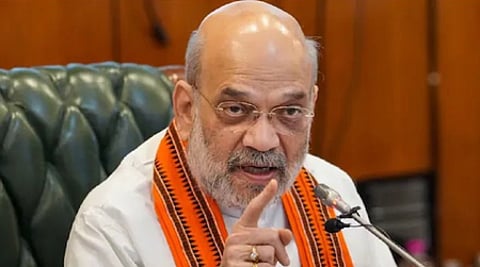

NEW DELHI: Union Home Minister Amit Shah said that the government has been taking 'transformative' steps to modernise the country’s criminal justice system by making mandatory visit of forensic teams to crime spot, in cases entailing punishment over seven years.
He also claimed that introducing three new criminal laws is the biggest reform of the 21st century.
Speaking at the ‘All India Forensic Summit’ organised, the Home Minister said, “Under the leadership of Prime Minister Narendra Modi, we are striving to ensure that those seeking 'justice' are receiving 'timely' justice too. The outcome is satisfying. Our main goal is to build a secure, capable and empowered India.”
Shah said, “The Government of India has introduced three new laws to strengthen the criminal justice system. This summit has been organised to discuss two key aspects: the effective implementation of these new laws and the future role of forensic science in countering terrorism.”
Highlighting the role of forensics in ensuring timely justice and improving conviction rate, Shah said, “The nature of crime has changed significantly --criminals are now using technology and modern communication tools, making crime borderless. Earlier, crimes were mostly confined to districts, cities, or countries, but now, they have no boundaries.”
Noting that this trend was recognised by PM Modi earlier too, Shah said, “In 2009, when PM Modi was the Chief Minister of Gujarat, he had proposed in the cabinet, the creation of a Forensic Science University in Gujarat -- a foundation that would support the country’s criminal justice system for the next 50 years.”
The Home Minister further noted saying: “If we are to ensure that even those accused do not face injustice, while also protecting the rights of victims, then forensic science must become an integral part of the criminal justice system.” He also argued that laws, which are not updated, fail to fulfill their purpose.
“The three old laws -- IPC, CrPC and Evidence Act -- were not made to deliver justice to citizens but to maintain the rule of the British government. The three new laws -- BNS, BNSS and BSA -- are made by the citizens, for the citizens, and to protect their rights. This is the biggest reform of the 21st century,” Shah noted.
Meanwhile, paying tribute to BR Ambedkar on his 135the birth anniversary, the Home Minister, his address, also said, his commitment to education, equality and justice and his significant role in shaping modern India.
“Babasaheb Bhimrao Ambedkar, who laid the foundation of social revolution through education, equality, and justice, remained committed throughout his life to securing the rights of the deprived,”the Home Minister said, adding that Ambedkar’s thoughts continue to inspire people today in building a just and egalitarian society.